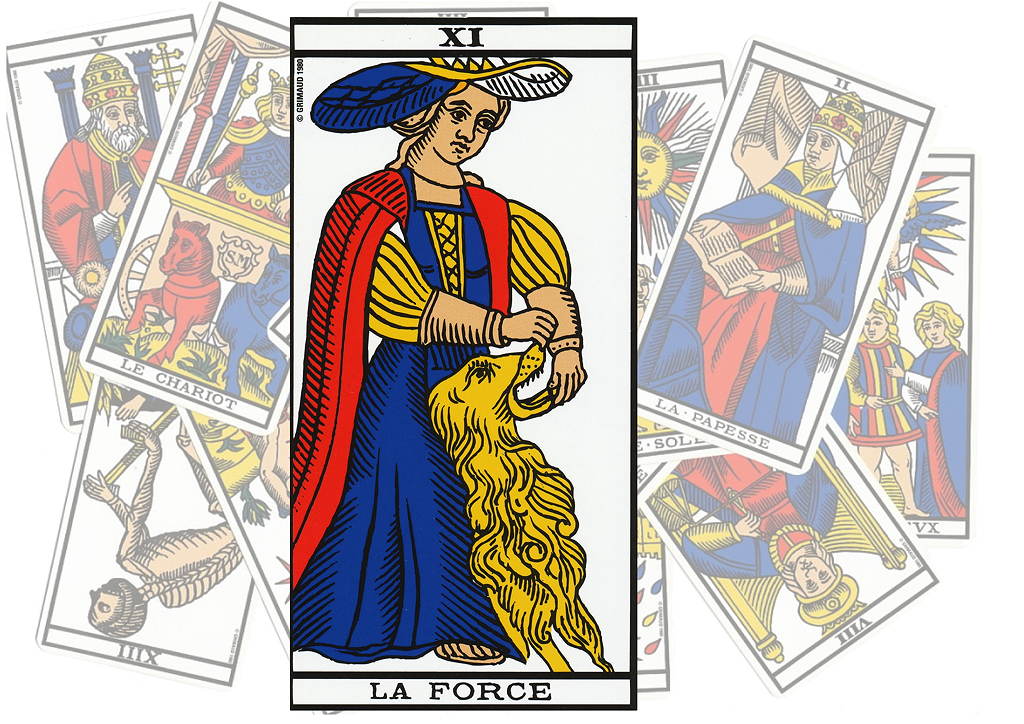The La Force tarot card, often referred to as Strength in most decks, embodies more than mere fortitude. In the realm of tarot, it signifies a profound amalgamation of inner strength and spiritual resilience. Viewed through a Christian lens, the interpretation of La Force takes on additional layers of meaning. This card serves as a metaphor for divine courage and fortitude that individuals receive through faith.
To understand the essence of La Force within a Christian framework, one must first grasp its symbolic nuances. The imagery typically depicts a woman gently taming a lion, representing both power and grace. This juxtaposition resonates deeply with Christian teachings that extoll the virtues of gentleness and humility in the face of trials. The lion, a biblical symbol often associated with majesty and ferocity, conveys the idea that true strength is not derived from domination but from temperance and compassion.
In a Christian context, La Force reflects the notion that virtue lies in the mastery of oneself. The card invites believers to contemplate the balance between their earthly desires and their spiritual aspirations. Just as Christ exemplified meekness while delivering powerful truths, so too does La Force encourage the faithful to embody strength that is reflective of God’s grace. Thus, the act of taming the lion can be viewed as a metaphor for the transformative power of faith, which enables individuals to confront and overcome their basest instincts.
This transformation is echoed in Christian doctrine, where believers are called to embody the fruits of the Spirit. Galatians 5:22-23 delineates attributes such as kindness, gentleness, and self-control, which are intrinsic to the essence of La Force. The card serves as a reminder that true strength involves perseverance and the ability to wield power thoughtfully. It suggests that, through divine assistance, one can face adversities with unwavering resolve, underscoring the interplay between human effort and divine intervention.
Moreover, the symbolism of La Force extends to the broader theme of suffering and redemption within Christianity. The card encourages believers to view their trials as pathways to spiritual growth. In moments of despair, when one’s faith is tested, the essence of La Force beckons them to cultivate resilience and find solace in their relationship with God. It fosters an understanding that it is through our struggles that we often become more attuned to divine grace. This perspective offers hope; suffering can ultimately lead to a deeper connection with the divine and self-understanding.
The metaphor of strength as a nurturing force becomes particularly salient when viewed through the lens of Christian love. Love is often characterized as the highest virtue in Christianity, and La Force embodies this by suggesting that real strength is intertwined with compassion. The card can be seen as a call to act decisively but with love, to engage in righteous deeds that contribute to the betterment of oneself and society. In a world where aggrandizement often masquerades as strength, La Force lovingly nudges adherents toward reevaluating their definition of personal power.
Within the narrative of the Gospel, parallels can be drawn between La Force and Jesus’ teachings. The call to “love thy neighbor” epitomizes the underlying message of the card, positing that true strength manifests in selfless acts of kindness and support. When faced with adversity, Christians are reminded of the strength drawn from community and brotherhood. La Force illustrates the synergy of interpersonal relationships and divine love; as we bolster one another, we echo the potent themes of strength Jesus portrayed during his earthly ministry.
Conversely, La Force also challenges believers to confront their fears and insecurities, compelling them to embrace vulnerability. By demonstrating that admitting weakness is not a flaw but rather a facet of humanity, the card invites introspection and growth. It posits that in recognizing one’s limitations, a more profound kind of strength can be cultivated—one grounded in faith. The potential for growth through trials is echoed throughout scripture, as believers are reminded that God’s power is most vividly displayed in our moments of frailty.
Ultimately, the appeal of La Force within a Christian context resonates with those seeking empowerment through faith. It embodies the understanding that strength and weakness are not opposing forces, but rather, they coexist in a delicate dance of spiritual development. The journey to manifest true strength requires a willingness to engage with one’s vulnerabilities while seeking divine support. The card echoes sentiments from Isaiah 40:31, where it is proclaimed that “those who hope in the Lord will renew their strength.”
As such, La Force stands as a beacon of hope and resilience for believers navigating a tumultuous world. It encourages a continuous pursuit of inner strength that is informed by love, compassion, and faith. Whether faced with personal struggles or broader societal challenges, the interpretation of La Force within the Christian perspective serves as a reminder of the infinite reservoir of strength available to those who profoundly trust in God’s grace. In this narrative, one finds not only the significance of strength but also the transformative power of faith that nourishes and sustains the soul.







Leave a Comment